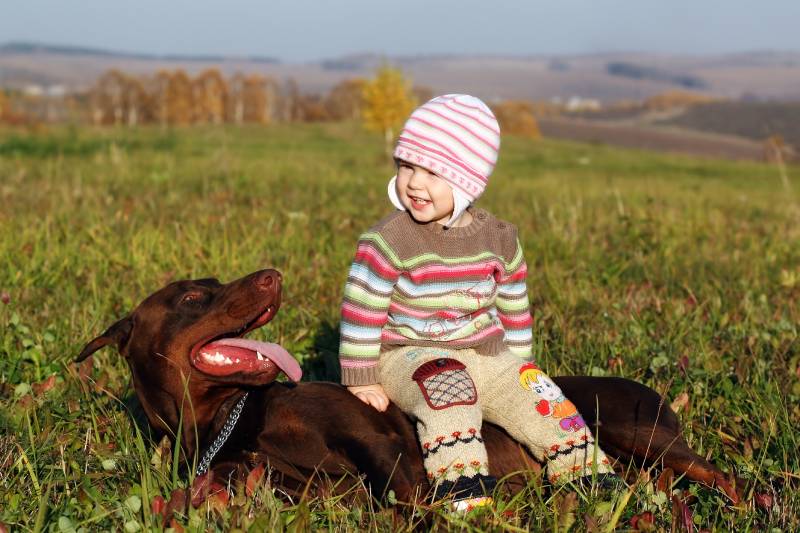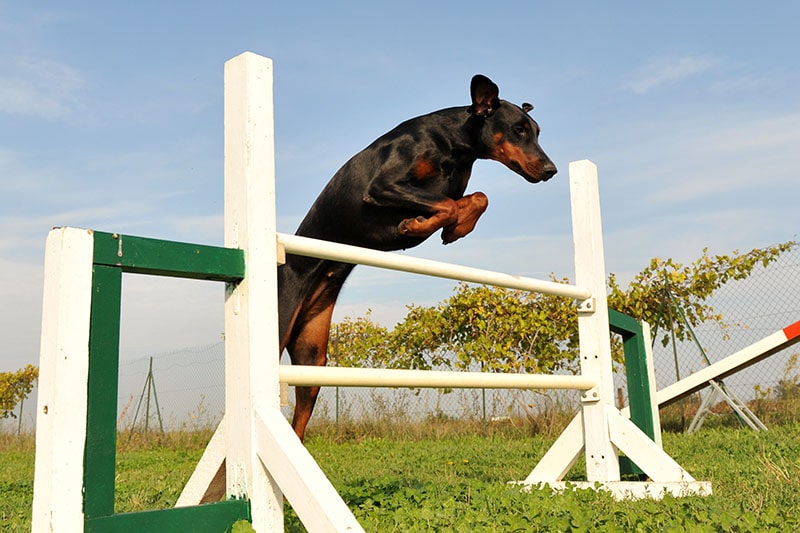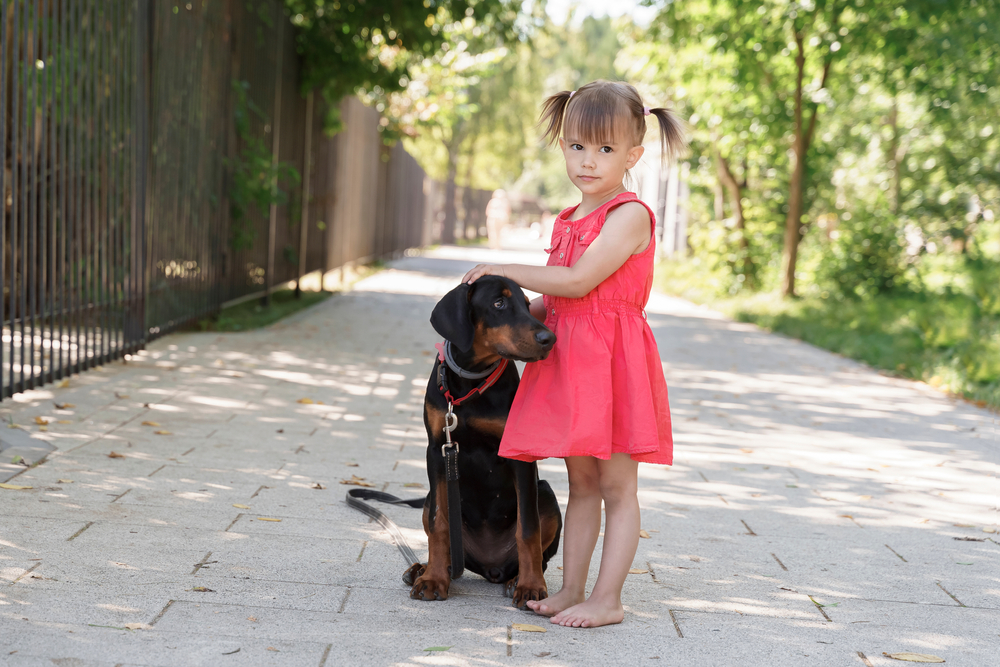In this article
View 2 More +Dobermans are sometimes labeled as aggressive problem dogs. However, this isn’t usually the case. Indeed, these dogs were initially bred for their protective capabilities, but they were also bred to be extremely trainable, loyal, and intelligent. Therefore, potential aggression can easily be combated by early socialization and training.
The American Temperament Test Society gives Doberman Pinschers a pass rating of 79.5%.1 In other words, 79.5% of all the Dobermans tested pass their temperament test. This test includes everything from interacting with strangers and other dogs to strange noises, like gunshots. If the dog shows any aggression, panic, or strong avoidance, the test is failed.
You can compare those test results to the Golden Retriever (85.6%), Greyhound (79.7%), and Corgi (79.6%). Based on these results, the Doberman has a pretty average aggression rating.
These dogs are extremely loyal and trainable. Therefore, they work great in a family that wants to take their dog places or participate in canine sports. They can also be trained as guard dogs, though we recommend a professional for this training.
Plus, they are also great with kids for several reasons.

Why Dobermans Are Great with Kids
Dobermans are a good option for children. Firstly, they are a nice middle size that allows them not to be scared of children while also not being massive. Most dog bites in children are from smaller dogs. Smaller dogs can easily become fearful of children, as they are often small enough to be injured by an overzealous toddler.
On the other hand, Dobermans are large enough to avoid this issue. When raised around children, most Dobermans will not be fearful. Their larger size allows Dobermans to be more confident in their surroundings.
These dogs are also energetic. They require loads of exercise, especially when they are puppies. In families with children, they have plenty of energy to keep up and spend lots of time playing.
Furthermore, they can also double as protection dogs. If you’re worried about safety, you can’t choose a much better dog than the Doberman. They were bred to guard their family, so they are very fitting as guard dogs.

Socialize, Socialize, Socialize
Socialization is key to having a Doberman who is a great family dog. As puppies, these dogs must be socialized often. You must socialize them until they are well adjusted and unfearful of most situations—and then socialize them some more.
As soon as their puppy shots are done, we recommend getting them involved in puppy classes. Puppy classes are great at teaching basic obedience, though you can start some commands as soon as your dog comes home. However, these classes also involve other dogs, allowing for socialization. Plus, your dog will also see new sights and people, so these classes are a great way to get your dog socializing early.
We do recommend group classes for maximum socialization. Group classes allow your puppy to see and interact with other dogs in a safe environment. Ask your trainer about socialization before signing up for the class. Many trainers will bring in their own trained dogs for socialization purposes. Socialization should be part of any quality puppy class.
However, you shouldn’t stop there. We also recommend taking your dog to as many places as possible. Consider looking up pet-friendly stores in your area and taking your dog to them. Even if you don’t need to purchase anything, simply walking your dog through a store can help them meet new people and interact with new smells.
While socialization is vital for puppies, you shouldn’t stop when they become adults. Socialization isn’t something that you do one time. Instead, it needs to be continuously performed as your dog ages. If you leave your adult dog home all the time, then the socialization you perform at an early age can wear off. Even older dogs need to revisit places and people outside of the home.

The 4 Reasons Why Owning a Doberman Might Not Be for You
While Dobermans do make great family dogs, there are many reasons why owning one may not be for you. It’s important to consider the pros and cons of a dog breed before adopting one.
1. Exercise Needs
These dogs do have high exercise needs. While this works great for many families, it may not work well for others. Therefore, we highly recommend considering how much your family exercises. Luckily, if you have a larger family, everyone can take part in exercising your Doberman. Younger children can play outside in a fenced-in area (with adult supervision, of course). Teens can help walk the dog. However, if your family doesn’t enjoy many active activities, this dog may not be for you.

2. Health Problems
Dobermans can come with some genetic health issues. While they are generally pretty healthy, this breed is prone to a few conditions. They tend to be less healthy than mixed breeds, for instance.
Many Dobermans get dilated cardiomyopathy at some point. Treating this usually requires medication and comes with raised vet costs. Purchasing from a qualified breeder may lower the odds of your dog getting one of these health conditions, as they often utilize genetic testing before breeding. However, health conditions can still occur.
3. Separation Anxiety
The Doberman can experience separation anxiety more frequently than other dogs. This canine was made to be loyal and protective of its family. When that family is gone, the dog can become anxious. Crate training a puppy at an early age can prevent separation anxiety. However, this is extra work and something to consider before adopting a puppy.

4. Training Requirements
These dogs need to be trained. While we highly recommend training for all dogs, Dobermans can be hard to control if they aren’t trained properly. Therefore, we recommend signing them up for puppy classes as soon as they receive their shots. You should put back enough money to train these dogs to a high level of control.
Socialization is also required. All of this requires more time and work on the owner’s part. Therefore, be sure you have enough time to accomplish these needs before you adopt.

Conclusion
Dobermans often have a reputation for being aggressive or difficult to handle. However, this isn’t always the case. With proper training and socialization, these dogs aren’t much more aggressive than your average canine. Plus, their trainability, energy level, and loyalty make them great family dogs. They often get along great with children as long as they are raised with them.
With that said, be sure to research this breed well before adopting one. They can be prone to certain heart conditions and require a lot of training. Knowing what you’re getting into before purchasing a dog is vital to ensure that the dog fits well into your family.
See also:
- Do Dobermans Smell More Than Other Dogs?
- Are Dobermans Smarter Than Average Dogs? The Interesting Answer!
Featured Image Credit: Lena Ogurtsova, Shutterstock


















